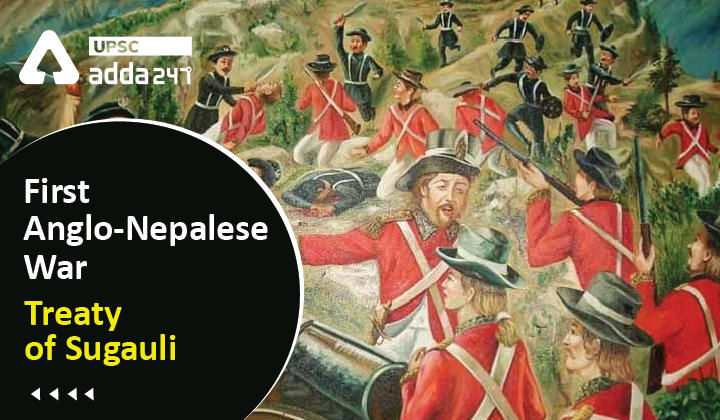Table of Contents
Anglo-Nepalese War- Relevance for UPSC Exam
- GS Paper 1: Indian History- Modern Indian history from about the middle of the eighteenth century until the present- significant events, personalities, issues.
Background of Anglo-Nepalese War
- Gorkhas established their control in the Nepal region in 1760 and from 1767 they started expanding their sphere of dominance to surrounding areas as well.
- It was easy for them to expand their territorial control in the southern part of Nepal (that is Indian Territories) as the northern parts were controlled by the Chinese.
- In this context, the British Aspirations to enhance their territorial might in the north, bringing them face to face with the Gorkhas of Nepal.
Causes of the Anglo-Nepalese War
- Economic Aspirations of the British: They wanted trade relations with the Tibet region. For this, the Rulers of the Kingdom of Nepal had to grant passage for the British which was declined by Gorkhas.
- Gorkhas were against the idea of opening their country for foreigners.
- Immediate Cause: The border dispute between India and Nepal provided the spark for the Anglo-Nepalese war 1814-16.
- The British Annexed the Gorakhpur region in 1801 and also acquired lands from the Nawab of Oudh which brought English face to Face with the Kingdom of Nepal.
- As the India-Nepal border was not clearly defined, a conflict between them was inevitable.
Course of the Anglo-Nepalese War 1814-16
- Bhimsen Thapa, the Ruler of the Kingdom of Nepal captured the Terai of Butwal and Sheoraj, angering then British Governor-General Lord Hastings (1813-23).
- In 1814, Governor-General Lord Hastings sent the British Army to invade Nepal, marking the beginning of the Anglo-Nepalese war of 1814-16.
- The Anglo-Nepalese war continued for two years and many battles were fought in between. A few important battles of the Anglo-Nepalese war are listed below-
- The Battle of Nalapani
- The Battle of Jaithak
- The Battle of Malaon
- In the Battle of Malaon in 1816, the Nepali Military Commander in Chief Amar Singh Thapa who was leading the Gorkha Army died in the battle.
- This led to the defeat of Gorkhas in the Anglo-Nepalese war which was concluded with the signing of the treaty of Sugauli in 1816.
Treaty of Sugauli 1816
- Loss of Territory: Gurkhas lost Sikkim, the territories of Kumaon and Garhwal, and most of the lands of the Tarai to the British East India Company.
- In return, the British East India Company promised to pay 200,000 rupees annually to compensate for the loss of income from the Tarai region.
- Increased British Influence in Nepal:
- Nepal accepted a British Resident in its Capital.
- Nepal war barred from employing any European to its service without prior permission from the British.
- Loyal Supporter: Gorkhas were allowed to get recruited in the British Army. With this Gorkhas became a loyal ally of the Britishers in India and helped them dominate over India.





 TSPSC Group 1 Question Paper 2024, Downl...
TSPSC Group 1 Question Paper 2024, Downl...
 TSPSC Group 1 Answer key 2024 Out, Downl...
TSPSC Group 1 Answer key 2024 Out, Downl...
 UPSC Prelims 2024 Question Paper, Downlo...
UPSC Prelims 2024 Question Paper, Downlo...




